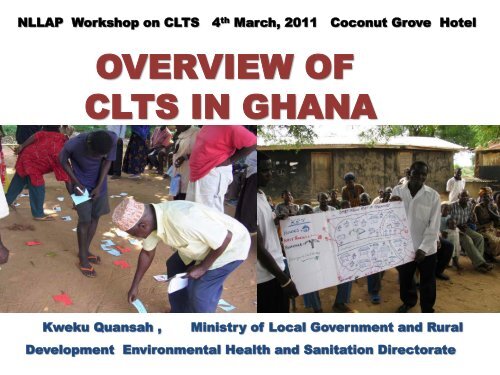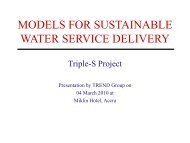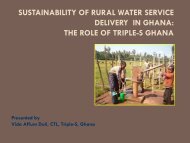CLTS IN GHANA
NLLAP Overview of CLTS in Ghana.pdf
NLLAP Overview of CLTS in Ghana.pdf
Create successful ePaper yourself
Turn your PDF publications into a flip-book with our unique Google optimized e-Paper software.
NLLAP Workshop on <strong>CLTS</strong> 4 th March, 2011 Coconut Grove Hotel<br />
OVERVIEW OF<br />
<strong>CLTS</strong> <strong>IN</strong> <strong>GHANA</strong><br />
Kweku Quansah ,<br />
Ministry of Local Government and Rural<br />
Development Environmental Health and Sanitation Directorate
Outline of Presentation<br />
• Background<br />
• <strong>CLTS</strong>, the Journey so far<br />
• Achievements<br />
• Challenges<br />
• Way Forward<br />
• Conclusion
Background<br />
• Poor sanitation crisis is acting as a brake on<br />
development efforts, constraining progress across<br />
all MDGs<br />
– Costs Sub Saharan Africa 5% of GDP per<br />
annum<br />
• Lack of adequate sanitation in schools is a critical<br />
barrier to learning<br />
– Sanitation-associated parasitic diseases have<br />
to impede learning and child development.<br />
– Girl school attendance is impeded, particularly<br />
after puberty. UNHDR 2006 p.<br />
• Safe disposal of excreta is one of the strongest<br />
determinants of child survival.
Background<br />
• Access to improved Sanitation is 13%, against an<br />
MDG target of 54%<br />
– Rural coverage is 8.2%<br />
– Urban coverage is 17.8%<br />
• 20% of Ghanaians defecate in the open, and in<br />
some regions, up to 80%<br />
• Ghana Moved only 5 percentage points (from 8%<br />
to 13%) in 18 years (between1990 and 2008)<br />
• We have only 5 years left to make up the<br />
remaining 41 percentage points to achieve the<br />
MDG target of 54%
What is <strong>CLTS</strong><br />
Background<br />
‣<strong>CLTS</strong> stands for Community Led Total<br />
Sanitation<br />
‣It is an integrated approach to achieving and<br />
sustaining Open Defeacation Free status and<br />
improved sanitation and good hygiene<br />
practices.<br />
‣ It empowers communities to analyse their<br />
sanitation conditions and take collective action<br />
to change their situation.<br />
‣ It focuses on collective change of attitudes<br />
and behaviour from all community members<br />
towards completely stopping Open Defecation.
Background<br />
• Practice of open-defecation is one of the most<br />
serious concerns in Ghana<br />
Traditional answers to solve the sanitation<br />
problem :<br />
– Focus on household toilet construction to<br />
improve sanitation access.<br />
– Provide high subsidy to build toilet.<br />
Assumptions:<br />
– Income is an issue.<br />
– Construction of toilets is the solution.<br />
Results:<br />
• Huge investments made under various<br />
projects/programmes.<br />
• Little Substantial progress in construction and<br />
visibility - Levels of coverage still very low.
Background-How we<br />
started<br />
The Traditional Approach<br />
• Awareness creation through Hygiene promotion<br />
• Capacity building for:<br />
– Communities (Volunteers/Assemblymen,<br />
Watsans/WSDBs, etc)<br />
– DA/DWSTs, EHAs<br />
– Private sector<br />
(LAs, POs, Consultants, )<br />
• Development and production of Materials<br />
• Provision of facilities-Household Latrines,<br />
Institutional Latrines<br />
• User education<br />
• Finance<br />
– financial assistance provided by projects in the<br />
form of subsidy – slab,ring beam, vent pipe, cost of<br />
labour
Background-How we<br />
Results<br />
started<br />
• Huge investments made since<br />
inception of WASH in Ghana<br />
– Demand for latrines low<br />
– Partial or non improved sanitation and<br />
hygiene<br />
– Partial use of latrines<br />
– Culture of dependence<br />
– Long term sustainability endangered<br />
– Levels of coverage still very low.
Background-How we<br />
started<br />
The Challenge is How to:<br />
Prevent Open Defeacation<br />
Increase demand for latrines<br />
Generate local funds and Resources<br />
Sustain behavioral change<br />
The Solution?<br />
....<strong>CLTS</strong>
<strong>CLTS</strong>, The Journey SO<br />
FAR<br />
‣<strong>CLTS</strong> was first discussed in Ghana in<br />
2004/5 at the stakeholder level.<br />
‣The first effort to actually implement<br />
<strong>CLTS</strong> was in 2006 in the Central<br />
region where the CWSA regional office<br />
working with a Consultant piloted it in<br />
four communities in the Twifo Heman<br />
Lower Denkyira district.
<strong>CLTS</strong>, The Journey SO FAR<br />
‣The lessons from this pilot and other<br />
initiatives like the APDO experiment at<br />
total sanitation, general challenges of up<br />
scaling sanitation motivated a UNICEF<br />
sponsored field trip to Bangladesh and<br />
Ethiopia in 2007<br />
‣Lessons from trip set the stage for<br />
increased recognition of the potential for<br />
the <strong>CLTS</strong> approach and expanded<br />
implementation of <strong>CLTS</strong> in Ghana.
<strong>CLTS</strong>, The Journey SO<br />
FAR<br />
‣In 2008, TREND collaborated with the CWSA<br />
to facilitate <strong>CLTS</strong> in selected districts in the<br />
Central, Greater Accra and Eastern regions<br />
as follows;<br />
• Greater Accra region, Ga West and Dangme West<br />
- eighteen (18) communities<br />
• Eastern region region, Kwahu South - four (4)<br />
communities<br />
• Central Region, Mfantsiman Municipal,<br />
Komenda/Edina/Eguafo/Abirem Municipal and<br />
Abura/Asebu/Kwamankesse district - twenty<br />
seven (27) communities
<strong>CLTS</strong>, The Journey SO FAR<br />
• Plan Ghana also initiated <strong>CLTS</strong> activities in<br />
three of its Programme Areas including<br />
Mankessim, Asesewa and Bawjiase.<br />
• With financial support from Unicef and EU<br />
under the I-WASH Project, EHS Unit initiated<br />
<strong>CLTS</strong> activities in the northern region<br />
• APDO has also been working with the<br />
approach in some selected regions.<br />
• Different approaches were used by different<br />
project-Consultants, POs, EHAs with Limited<br />
supported, Sanimarts etc
Achievements<br />
• National Technical Working Group on Sanitation –<br />
enhanced stakeholder consultations<br />
• “Triggered key sector stakeholders”<br />
• Incorporation of <strong>CLTS</strong> as one of the major<br />
approaches in the Environmental Sanitation Policy<br />
• <strong>CLTS</strong> Incorporated in NESSAP/DESSAPs<br />
• National <strong>CLTS</strong> Strategy-Ongoing<br />
• Capacity building for Key stakeholders<br />
• Targeting SOHs<br />
• National ODF Declaration Checklist<br />
• Awards and Recognition of <strong>CLTS</strong> Communities<br />
• High Government commitment<br />
• Achieved high Donor confidence<br />
• Dr. Kamal Kar’s support <strong>CLTS</strong> in Ghana
Achievements<br />
‣Design of a wide range of materials<br />
to support roll out of the concepts of<br />
Sanitation Ladder and the <strong>CLTS</strong><br />
• Manuals on technology options for SL<br />
• Posters, information materials on <strong>CLTS</strong> and<br />
SL<br />
• Detailed Design of sanitation markets<br />
• Revised curricula for training of artisans and<br />
Sanimart Managers<br />
‣Documentary videos on <strong>CLTS</strong><br />
‣ Assessment of Ghana’s <strong>CLTS</strong> by an<br />
international consultant
Achievements - District<br />
level<br />
‣ Orientation /Sensitisation of Key DA staff<br />
on <strong>CLTS</strong><br />
‣ Modules for orienting DAs on <strong>CLTS</strong><br />
developed and tested<br />
‣ DWSTs /EHAs trained and equipped to<br />
facilitate <strong>CLTS</strong> approach<br />
‣ Artisans trained on <strong>CLTS</strong> and Sanitation<br />
Ladder approach
Achievements -<br />
Community level<br />
‣ Revival of sense of social solidarity<br />
‣ Improvement in behaviours and attitudes<br />
‣ Communities have attained ODF within a<br />
relatively short timeframe, process ongoing<br />
in other communities<br />
‣ Emergence of natural leaders ready to<br />
support sanitation and hygiene issues<br />
‣ Use of local materials and low cost<br />
technologies
Outcomes -Innovation of locally<br />
appropriate and affordable latrines
Outcomes-Hygiene and<br />
Sanitation<br />
Clean refuse dump Waste water management Compost Pit
Outcomes-Hygiene and<br />
Sanitation<br />
Clean Communal Facilities
CHALLENGES<br />
‣Inadequate skilled facilitators<br />
‣Inadequate Funding for <strong>CLTS</strong> Activities<br />
‣Ineffective Post Triggering M&E<br />
‣Poor Institutional Coordination<br />
‣Limitations in peri-urban and urban<br />
areas<br />
‣Knowledge management-documentation,<br />
experience sharing<br />
‣Limitations with promotion of the<br />
sanitation ladder approach
ODF: PRIDE OF EVERY COMMUNITY
Looking Ahead<br />
• Empower Natural Leaders to become champions<br />
and facilitators of <strong>CLTS</strong>.<br />
• Facilitate the declaration of entire areas as ODF<br />
• Establish a national ODF league showing the<br />
status of districts and the setting up of awards<br />
for high performing districts and regions every<br />
year.<br />
• Harness the power of children to promote ODF<br />
declaration in their communities in the<br />
Ghanaian context.<br />
• Incorporate <strong>CLTS</strong> indicators into the assessment<br />
criteria of the Functional Organizational<br />
Assessment Tool (FOAT).
Looking Ahead<br />
• Establish of interagency coordinating committees<br />
on sanitation to enhance collaboration among<br />
stakeholders at the district and regional levels.<br />
• MMDAs should be firm and resist any sanitation<br />
interventions contrary to <strong>CLTS</strong> principles and<br />
improve on their coordination roles<br />
• Develop of national, regional and district plans for<br />
scaling up <strong>CLTS</strong> in Ghana<br />
• Build capacity of EH Staff and Natural Leaders<br />
• EHSD to appoint focal persons for <strong>CLTS</strong> at<br />
National, Regional and District Levels
Conclusion<br />
Construction of subsidy-base latrines<br />
have not achieved the desired objectives.<br />
<strong>CLTS</strong> is one of the most reliable<br />
approaches to scale up access to<br />
sanitation in Ghana.<br />
With good facilitation, required material<br />
support and monitoring, <strong>CLTS</strong> has the<br />
potential of bringing Ghana back on track<br />
to achieve her MDG on sanitation
Thanks






